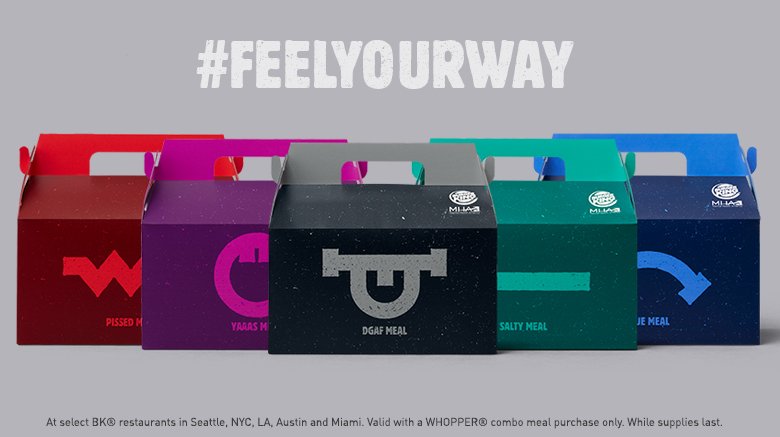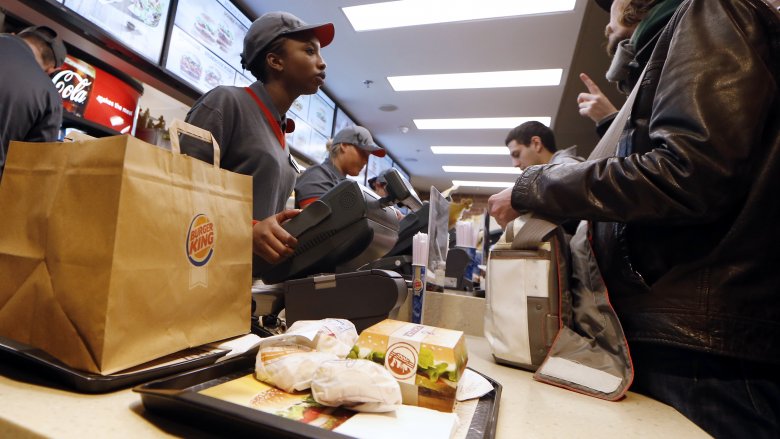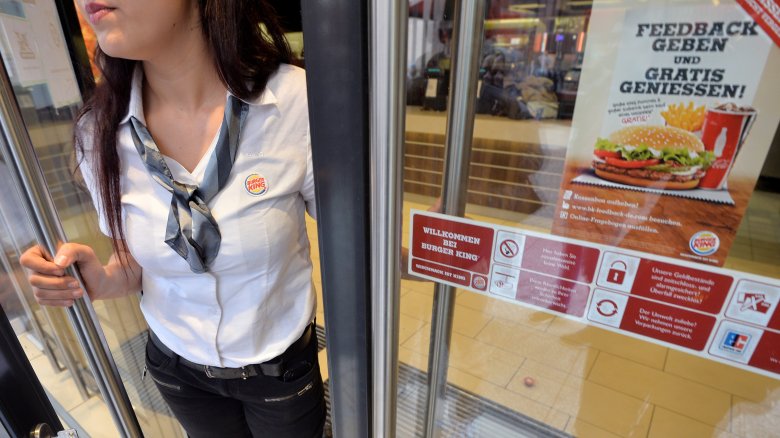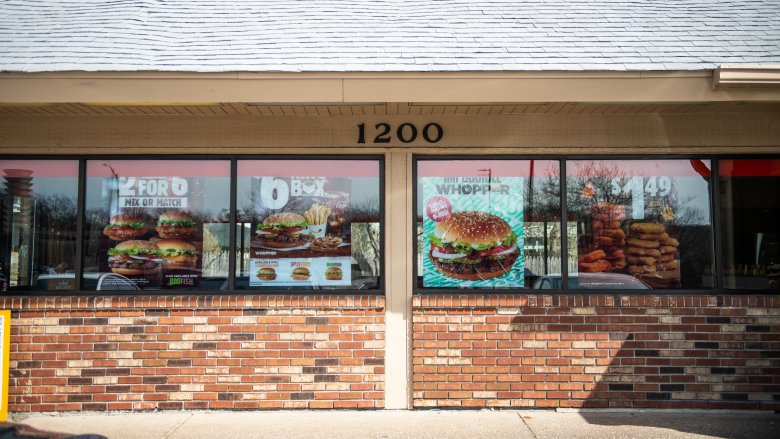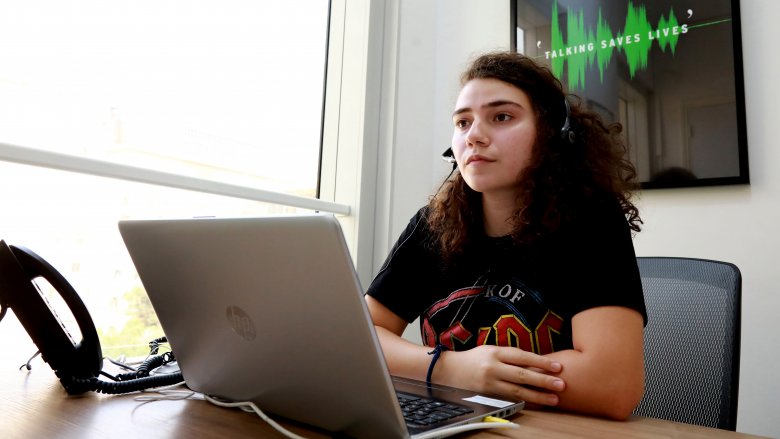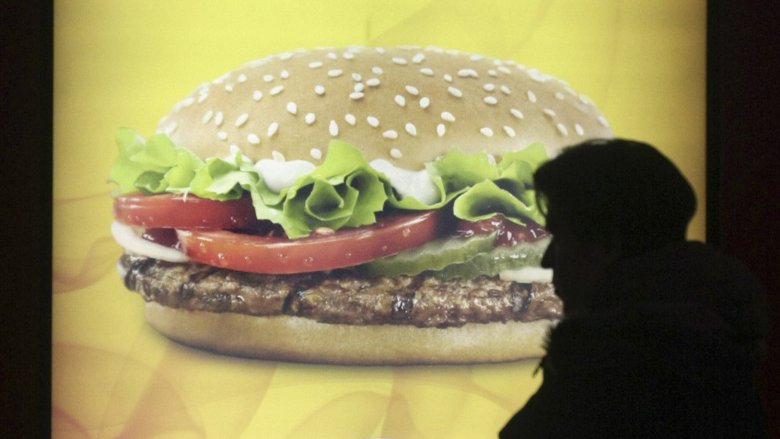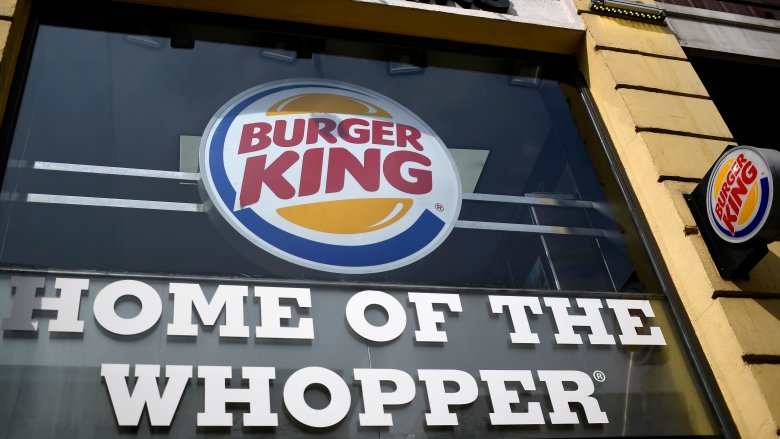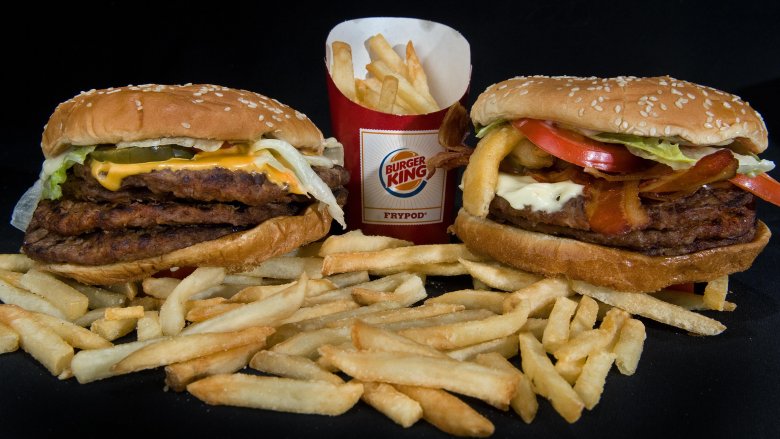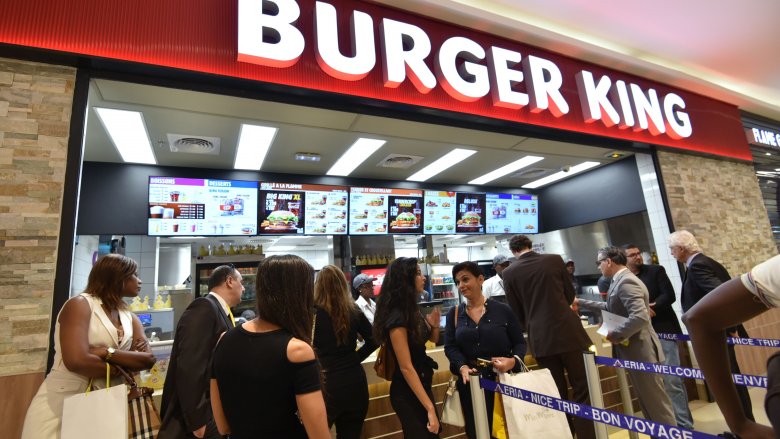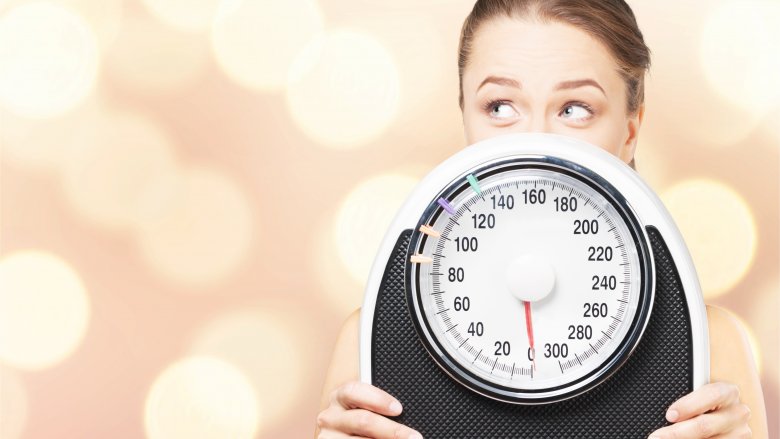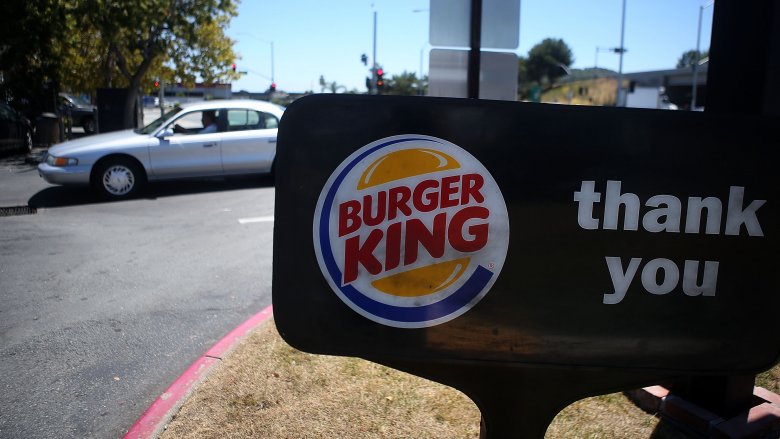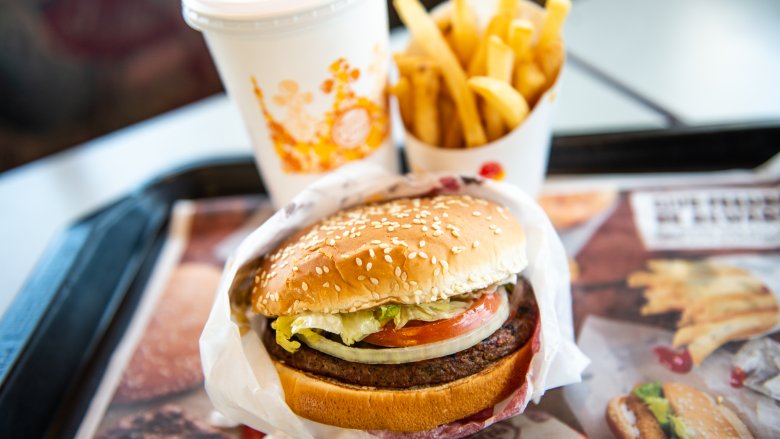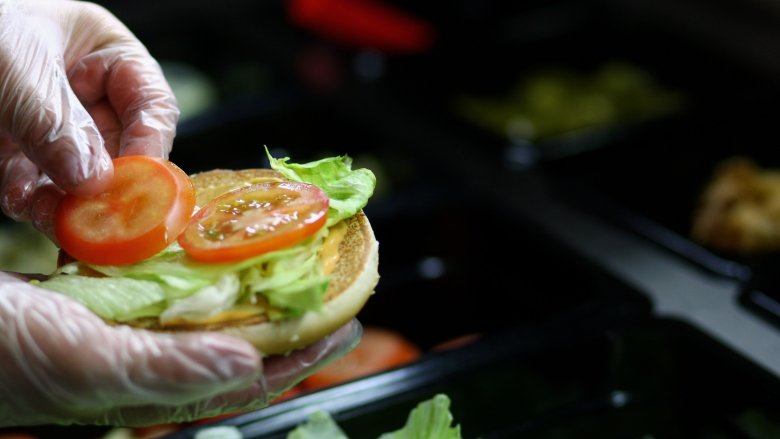Twitter Reacts To Burger King's 'Unhappy' Meals
For May 2019, Burger King announced they were going to be partnering with Mental Health America for a new product: Real Meals. The idea was a different take on the Happy Meal, and it came in a few different moods that included the Salty Meal, the YAAAS Meal, the DGAF Meal, the Blue Meal, and the Pissed Meal.
Inside was pretty standard Whopper meal, but it was the boxes and the message that got the public's attention. And that was the plan all along, according to Paul Gionfriddo, the president and CEO of MHA. He had this to say: "While not everyone would think about pairing fast food and mental health, MHA believes in elevating the conversation in all communities in order to address mental illness..."
Why May? Because it's Mental Health Month, and 2019 marks a milestone. It's the 70th year they've recognized the month, and while no one can deny that huge steps have been taken in raising awareness around mental health issues, there's still a long way to go. Where does social media think Burger King's Real Meals fit?
Cue depression eating
Of all the Real Meals, it was the Blue Meal that seems to have gotten the most attention. Unfortunately for Burger King, not all of that attention was good.
Take a tweet from podcast host and New York Times bestseller Ben Shapiro, who commented on Burger King's ad campaign: "This is a hell of an ad for depression eating."
Some employees are angry at the irony
Burger King's announcement of their Real Meals got some incredulous disbelief and anger from a very specific set of Twitter users: employees and their supporters. And some of the tweets are pretty heartbreaking. @Clarii_fairyy had this to say: "This tweet has me feeling a certain type of way because when [I] was an assistant manager at BK I was so overworked and stressed that I cried in the walk-in multiple times...". She continued: "Spreading good vibes is wonderful and I support it, but it's very frustrating to see these tweets and have had employees cry in the office b/c of mistreatment."
Others weren't shy about calling out the hypocrisy they saw, either, and @PonyToast offered up this scenario: "BK Employee: 'Hey boss, I need an extra day off to go see my therapist.' BK Manager: 'Either you work the hours you're scheduled or you're fired.' #truestory"
Still others called Burger King out in tweets asking for more employees to be hired to relieve the stress of covering all shifts, and in other tweets, people were calling for BK to pay a living wage and provide health insurance that would allow their own workers to get help. Burger King hadn't responded by the time of this writing.
Silence, brand
Burger King's original tweet about their Real Meals was simple, straightforward, and to the point: "not sure who needed to hear this today, but it's ok not to be happy all the time. All that matters is that you #FeelYourWay."
A lot of people didn't even bother to respond in words, and instead chose to tell Burger King just what they thought with the "silence, brand" meme. Given the sheer number of times the meme appeared in the responses, there was a good portion of Twitter that just didn't want to hear what Burger King had to say.
pic.twitter.com/xM51jMZ1Bw
— yuumi main (@smallgamedev) May 2, 2019
An appeal for resources
One response that came from the Crisis Text Line brought up something they saw as a serious oversight, and that's a lack of help and crisis numbers that went along with the announcement and the meals themselves. They appealed: "Please include resources when you're talking about mental health. People who are struggling may need someone to talk to."
In order to answer that plea, we'll add that in order to reach the Crisis Text Line, text "HOME" to 741741 for 24/7 crisis support in the U.S. MentalHealth.gov has several other numbers that may be useful, depending on your situation. For the National Suicide Prevention Lifeline, call 1-800-273-TALK. To reach the SAMHSA Treatment Referral Helpline, call 1-877-SAMHSA7.
To reach the Veterans Crisis Line, call 1-800-273-8255, and Press 1.
The terrible pairing of junk food and depression
Producer and director Jesse Zook Mann also took to Twitter to call BK out on something else, and pointed to a multi-country study that indicated a link between what you eat and how you feel. He tweeted: "Why is a large mental health organization working with Burger King... a company that makes money by making Americans MORE depressed? The data is clear. Inflammatory foods like Burger King increase risk of depression."
The Guardian covered the study he's referring to in 2018. Researchers compiled data from 41 different studies and in a nutshell, found that a diet heavy in fat and sugar were linked to higher risk of depression. Details weren't known yet, but researchers surmised that systemic inflammation caused by poor diet "can directly increase the risk for depression."
Twitter user @StatsInTheWild agreed, tweeting: "This is monumentally stupid. You know what is a good way to help fight depression? Eating healthy. You know, like never eating anything from @BurgerKing. Ever."
A lot of people wanted them more widely available
Burger King did a really weird thing, and made their Real Meals only available at five restaurants. They tweeted that they could be purchased in Seattle, New York City, Los Angeles, Austin, and Miami Beach, but only at specific stores. That left a ton of people wondering why they couldn't get one.
People from as far away as Argentina were lamenting they couldn't get in on the anti-Happy Meals, but it was @kwalidy that summed it up best when they tweeted: "Not available anywhere near me. Someone at corp has been eating too many dgaf meals." Burn.
The rise of the new "Big Tobacco"
Still others drew an unsettling parallel and likened Burger King's involvement in mental health awareness to the one-time supremacy of the massive tobacco corporations.
@Sophia_molinar1 tweeted: "Encouraging to eat our feelings? When there's a crazy obesity crisis especially in America?? It's ok, you'll just continue to make more money when we all have heart disease and diabetes. Looks like there's a new Big Tobacco! And they're not even selling cigs!"
She's not the only one that saw the connection, with others — like @__s_m-__ — volunteering the idea that BK was doing much the same as Phillip Morris had once done, cashing in on addiction and destroying the bodies of their customers.
Some appreciate the acknowledgement
Not all the reaction was bad, and there were plenty of tweets thanking Burger King for their acknowledgement that no, not everyone is happy all the time.
Take the tweet from @Ordyh07, who said, "I respect @BurgerKing for the #FeelYourWay program to help raise awareness for Mental Health for the kids. Kids don't be afraid to go speak out on any issues you got going inside your mind."
And that's a powerful message plenty of other people agreed with. @JTrademarc tweeted: "This advertisement is amazing and it's real talk. To whom is having mixed feelings this ad is definitely doing it's job for you because it's fine to #FeelYourWay."
They overlooked an important mental health issue
Even though it's the Blue Meal that's getting a lot of the attention, Burger King included all different kinds of moods in their Real Meals. But radio presenter Angie Greaves pointed out that their message was in direct conflict with one particular group of people suffering from their own set of mental health issues, and they're issues that impact a large number of people.
She tweeted: " ... What about people with eating disorders? Is this being insensitive? I have so many questions..."
They were going for acknowledgment
Mental Health America — Burger King's partner in the endeavor — also responded to the announcement of the Real Meals. What did they have to say about it?
"We teamed up with @BurgerKing to bring #mentalhealth awareness to the table. Feelings aren't facts, but they're real and so are you. It's ok to not be ok, so #FeelYourWay this #MentalHealthMonth."
And that sort of clarifies the goal behind the entire thing. They wanted to start a conversation, and they definitely did. @DrStevenProctor said that it had worked for him, tweeting: "...Many of us were raised to 'put on a happy face' & hide negative #feelings. All #emotions are a part of the human experience. Thanks for the reminder, BK."
Accusations it's just for marketing
Some in the Twitterverse saw Real Meals not as a way to raise awareness, but as a way for Burger King to capitalize on some of the most difficult emotions people struggle with. DepressionArmy tweeted: "yes, it is ok to #feelyourway, but is a bit ify [sic] as a way to sell burger."
Others agreed that it was in questionable taste. @elementartyy tweeted: "Burger King is the latest brand to use depression as a marketing tool," and @BridgetPhetasy was even more direct, tweeting: "Millions of marketing dollars went into making you feel good about feeling bad so you could enjoy a whopper."
The danger in the message it's "your" way
Others saw something sinister in Burger King's #FeelYourWay slogan, and stressed that while it's important to legitimize mental illness, it's also important to stress that seeking help is more important than just accepting depression as something that's "you."
@leafer1969 tweeted: "Depression and anxiety are conditions. Not traits to be identified with. Neither they are an attribute or element of one's true intimate self. They're things to be treated & be alleviated from. So, really there is no #FeelYourWay with this debilitative message. Simply, horrible."
Others agreed. @StallardSean tweeted: "It's not ok to #feelyourway. If you're having negative thoughts, contact a professional, go to a hospital, meet with friends, go for a walk. Do not eat food that will only make you feel worse." And @aaronjayledesma put it another way, tweeting: "Like, when you would ever tell someone suffering from depression to #feelyourway? You wouldn't tell them 'yeah feel depressed!' Not sure who thought this was a good idea. Please end this campaign."
